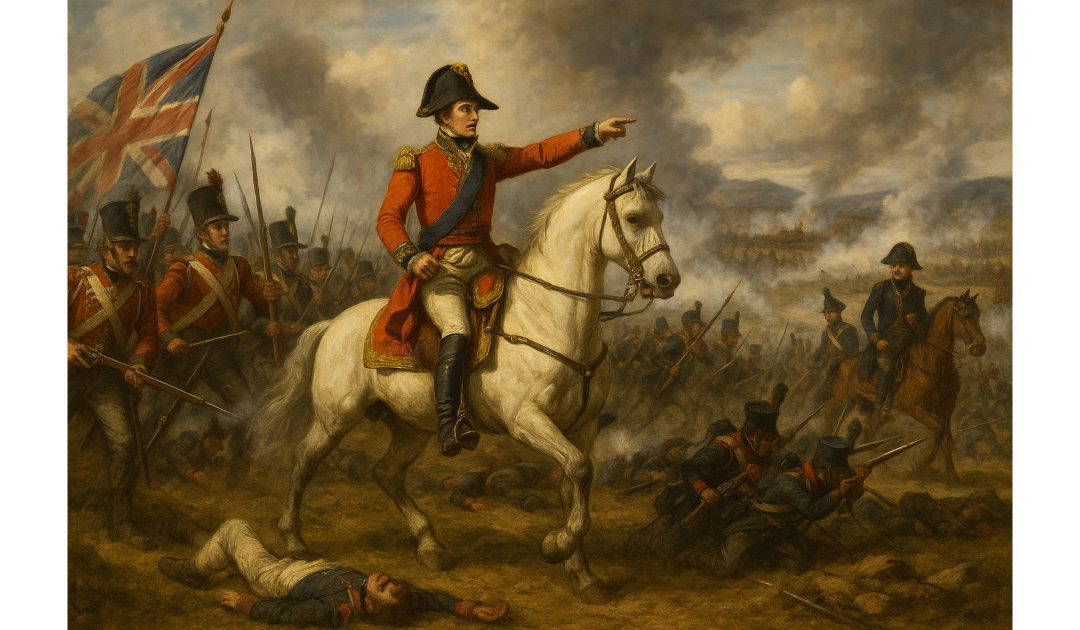On the 21st of August, 1808, British and Portuguese forces led by General Arthur Wellesley defeated French forces commanded by Major-General Jean-Andoche Junot near the village of Vimeiro in Portugal. It was the second victory of the Anglo-Portuguese alliance in the Peninsula War.
The Peninsular War, fought from 1808 to 1814, was a significant conflict within the broader Napoleonic Wars, which reshaped European political landscapes in the early 19th century. This war unfolded on the Iberian Peninsula, involving Napoleon Bonaparte’s French Empire against an alliance of Spain, Portugal, and the United Kingdom. It was marked by both conventional battles and guerrilla warfare, ultimately contributing to Napoleon‘s downfall.
The roots of the Peninsular War lie in Napoleon’s ambitions to enforce the Continental System, an economic blockade designed to cripple Britain’s trade. Frustrated with Portugal’s persistent trade with Britain, Napoleon sought to control the Iberian Peninsula. Initially, he secured Spanish cooperation through the Treaty of Fontainebleau (1807), which allowed French troops to march through Spain to invade Portugal. However, Napoleon’s ulterior motive soon became clear as he turned against Spain, exploiting political instability to install his brother, Joseph Bonaparte, as King of Spain in 1808.
Napoleon’s imposition of Joseph Bonaparte sparked widespread outrage among the Spanish population, leading to a surge of nationalism. The infamous Dos de Mayo Uprising on 2 May 1808 in Madrid epitomised the Spanish resistance. French forces brutally suppressed this rebellion, but it ignited a broader insurrection across the country. The Spanish resistance was unique, relying heavily on guerrilla tactics—small, mobile groups conducting ambushes and sabotage. This form of warfare proved highly effective against the conventional military strategies employed by the French.
The British, under the leadership of Arthur Wellesley (later the Duke of Wellington), seized the opportunity to support the Iberian resistance. Wellesley’s initial victories at the Battle of Roliça and the Battle of Vimeiro in 1808 secured Portugal, forcing French forces to withdraw temporarily. The British established Portugal as a stronghold, using it as a base for subsequent operations.
Conventional battles defined much of the conflict, with notable engagements such as the Battle of Talavera (1809), where Wellesley’s forces, bolstered by Spanish troops, repelled a French assault. Despite tactical victories, coordination issues between British, Portuguese, and Spanish forces often hampered strategic success. Nevertheless, Wellington’s leadership and the resilience of the Iberian people gradually turned the tide.
A pivotal moment came with the Lines of Torres Vedras, a system of fortifications constructed in 1810 to protect Lisbon. These defences effectively halted Marshal Masséna’s French army, leading to his retreat and signalling the decline of French dominance in the peninsula. Concurrently, guerrilla warfare intensified, severely disrupting French supply lines and communication, exacerbating the strain on Napoleon’s overstretched military resources.
By 1812, the strategic initiative firmly lay with the Allies. Wellington’s army launched a series of successful offensives, including the storming of Ciudad Rodrigo and Badajoz, and the decisive victory at the Battle of Salamanca. These triumphs forced the French to retreat from much of Spain, culminating in the liberation of Madrid.
The final phase of the Peninsular War saw the Allies advancing into French territory. The Battle of Vitoria in 1813 was particularly significant, where Wellington’s forces decisively defeated the French, effectively ending Joseph Bonaparte’s reign in Spain. Subsequent battles, such as those at the Pyrenees and Toulouse, further eroded French control.
The Peninsular War concluded with Napoleon’s abdication in 1814. Its impact was profound: it drained French manpower and resources, weakened Napoleon’s influence, and inspired resistance movements across Europe. The war also showcased the effectiveness of coalition warfare and guerrilla tactics, influencing military strategies in subsequent conflicts.
Additionally, the Peninsular War had lasting effects on the nations involved. Spain experienced significant political and social upheaval, leading to constitutional reforms and the eventual decline of its colonial empire. Portugal strengthened its ties with Britain, shaping its future international relations. For Britain, the war enhanced its military reputation, with Wellington emerging as a national hero.

